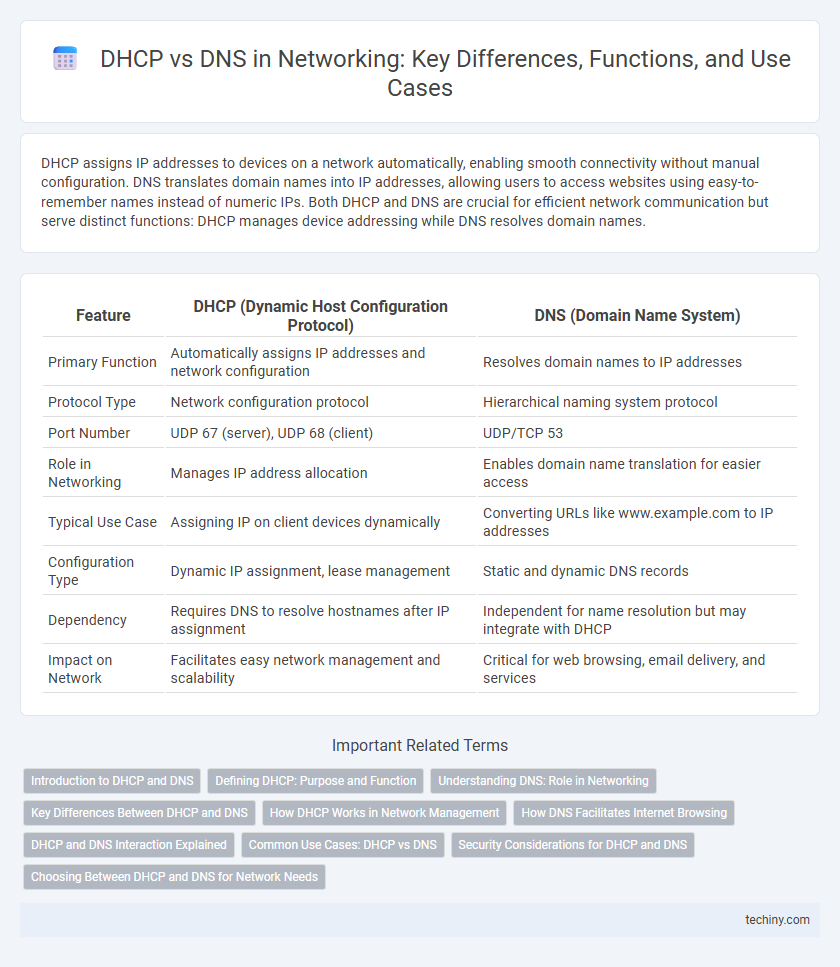DHCP assigns IP addresses to devices on a network automatically, enabling smooth connectivity without manual configuration. DNS translates domain names into IP addresses, allowing users to access websites using easy-to-remember names instead of numeric IPs. Both DHCP and DNS are crucial for efficient network communication but serve distinct functions: DHCP manages device addressing while DNS resolves domain names.
Table of Comparison
| Feature | DHCP (Dynamic Host Configuration Protocol) | DNS (Domain Name System) |
|---|---|---|
| Primary Function | Automatically assigns IP addresses and network configuration | Resolves domain names to IP addresses |
| Protocol Type | Network configuration protocol | Hierarchical naming system protocol |
| Port Number | UDP 67 (server), UDP 68 (client) | UDP/TCP 53 |
| Role in Networking | Manages IP address allocation | Enables domain name translation for easier access |
| Typical Use Case | Assigning IP on client devices dynamically | Converting URLs like www.example.com to IP addresses |
| Configuration Type | Dynamic IP assignment, lease management | Static and dynamic DNS records |
| Dependency | Requires DNS to resolve hostnames after IP assignment | Independent for name resolution but may integrate with DHCP |
| Impact on Network | Facilitates easy network management and scalability | Critical for web browsing, email delivery, and services |
Introduction to DHCP and DNS
Dynamic Host Configuration Protocol (DHCP) automates the assignment of IP addresses, subnet masks, gateways, and other network parameters to devices, ensuring seamless connectivity within a local network. Domain Name System (DNS) translates human-readable domain names into IP addresses, enabling users to access websites and services without memorizing numerical addresses. Both DHCP and DNS are fundamental components of modern networking, streamlining device communication and resource accessibility across the internet and private networks.
Defining DHCP: Purpose and Function
Dynamic Host Configuration Protocol (DHCP) automates the assignment of IP addresses and network configuration parameters to devices, enabling seamless network connectivity without manual intervention. It streamlines network management by dynamically allocating IP addresses, subnet masks, default gateways, and DNS server information to clients. DHCP reduces configuration errors and optimizes IP address utilization in LANs and enterprise networks.
Understanding DNS: Role in Networking
DNS (Domain Name System) translates human-readable domain names into IP addresses, enabling seamless access to websites and network resources. It functions as the internet's phonebook, resolving domain names to numerical IP addresses required for routing traffic. Unlike DHCP, which dynamically assigns IP addresses to devices, DNS focuses on name resolution and hostname mapping within network infrastructure.
Key Differences Between DHCP and DNS
DHCP (Dynamic Host Configuration Protocol) automatically assigns IP addresses and network configuration parameters to devices, enabling them to communicate on a network. DNS (Domain Name System) translates human-readable domain names into IP addresses, facilitating the location of devices and services on the internet. The key difference lies in DHCP managing IP address allocation, while DNS resolves domain names to IP addresses, both essential for efficient network operation.
How DHCP Works in Network Management
DHCP (Dynamic Host Configuration Protocol) automates the assignment of IP addresses within a network, streamlining device connectivity and reducing manual configuration errors. It operates by leasing IP addresses to clients from a predefined pool, ensuring efficient IP address management and avoiding conflicts. DHCP servers also provide essential network configuration parameters such as subnet masks, default gateways, and DNS server addresses to client devices.
How DNS Facilitates Internet Browsing
DNS translates human-friendly domain names into IP addresses, enabling browsers to locate websites quickly and accurately. Without DNS, users would need to remember complex numerical IP addresses to access online resources. This system streamlines internet browsing by resolving domain names into server locations almost instantaneously.
DHCP and DNS Interaction Explained
DHCP dynamically assigns IP addresses to devices, enabling them to join a network without manual configuration, while DNS resolves these IP addresses into human-readable domain names. Their interaction ensures seamless network connectivity by allowing DHCP to provide DNS server information to clients during IP address allocation. This integration optimizes network resource access and maintains efficient communication between devices and domain name resolution services.
Common Use Cases: DHCP vs DNS
DHCP is commonly used for dynamic IP address allocation, enabling devices to join networks automatically without manual configuration. DNS serves to translate human-friendly domain names into IP addresses, facilitating website access and resource location. Both protocols work together to streamline network connectivity and user experience by managing address assignment and name resolution respectively.
Security Considerations for DHCP and DNS
DHCP security risks include unauthorized IP address allocation and DHCP spoofing, which can lead to network disruptions and man-in-the-middle attacks. DNS security vulnerabilities involve DNS spoofing and cache poisoning, which can redirect users to malicious sites and compromise sensitive data. Implementing secure protocols such as DHCP snooping and DNSSEC helps mitigate these threats by ensuring trusted source validation and data integrity.
Choosing Between DHCP and DNS for Network Needs
Choosing between DHCP and DNS for network needs depends on their distinct roles: DHCP dynamically assigns IP addresses to devices, ensuring efficient IP management and reducing configuration errors, while DNS translates domain names into IP addresses, facilitating user-friendly access to network resources. For networks prioritizing automated IP allocation and device connectivity, DHCP is essential, whereas networks emphasizing easy hostname resolution and web navigation rely on DNS. Optimal network performance often requires integrating both services to handle IP distribution and name resolution seamlessly.
DHCP vs DNS Infographic

 techiny.com
techiny.com